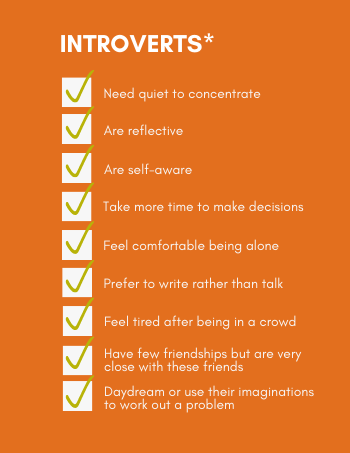4 Tips to Help Introverted Leaders Succeed in the Workplace

It is widely believed in Western culture that to be a great leader you should be an extrovert. “You need to be able to walk in front of a microphone in front of a big group, capture the crowd and be charismatic be outgoing. Think politicians, kissing babies. And that is far from the truth, explains Brad Eure, co-founder of Eure Consulting. Adding, “There are a lot of strengths that extroverts have. There are just as many that introverts have.“
According to Eure, introverts make up nearly half the population. If you think you are an introvert, you are far from being alone.
Introverts: Why the Bad Wrap?
A hundred years ago, Carl Jung defined a person as being either introverted or extroverted by how they process the world around themselves and how they get and spend energy. There are varying degrees of each, and a person can be considered an ambivert, but to simplify it: extroverts seek out and get energy and stimulation from their outside environment. It energizes them. Introverts are the opposite.
For many introverts, quarantine life today is a little easier, as most of the mixing and mingling and interruptions they encountered pre-pandemic has come to a standstill.
Introverts are sometimes stereotyped as “anti-social” or “shy”, but those traits are found in extroverts as well. “Being shy is social anxiety and it affects both introverts and extroverts,” says Eure.
“Introversion is not anti-social, is not “curable” because it is not a disease. It isn’t a choice. It is not right. It’s not wrong. It is just who you are. And it doesn’t disqualify you from being a good leader. We have found that introverts are phenomenal leaders. All of us have our strengths and all of us have our weaknesses,” he adds.
Quiet, Introvert in the House
Do you find that you often need to retreat to a quiet space to concentrate, reflect, or rest? You don’t like to rush decisions, are comfortable when alone, and prefer to write rather than talk?
If some of these traits sound like you, congratulations! You are more than likely an introvert. You have a unique self-awareness. Use that and these tips to help you be the best communicator and leader you can be.
4 Tips to Help Introverts Manage Themselves, Meetings, and Others*
#1) Own who you are.
Some may think extroverts are “natural” leaders but don’t try to be something you are not. Replace myths about leadership with truths. Be yourself, be authentic and be open and honest. This will build trust. Purposely surround yourself with people who complement your abilities and style.
Bonus tip: Eure suggests checking out “The Five Dysfunctions of a Team: A Leadership Fable” by Patrick Lencioni.
#2) Become adept at facilitating meetings when introverts and extroverts are together.
Eure reports that extroverts often dominate meetings and speak without thinking. They think passion/words/volume proves their arguments. Facilitate meetings with that in mind. Ask questions and speak up last. Draw out comments from other introverts and let them know ahead of time that you will seek their input. Like you, they want to have time to think about how they will answer.
Bonus tip: Set ground rules or Rules of Engagement for your meetings to ensure a safe space.
#3) Clearly define roles, expectations, values, and processes.
The best way to manage introverts and extroverts is by clearly defining roles, expectations, and core values. Schedule regular feedback sessions that are clear, consistent, caring, candid, and challenging. Create and strictly follow processes for everyone. Understand extrovert traits so that you are not put off by them and can lead them in the most effective way.
Bonus tip: Eure likes the Radical Candor approach.
#4) Understand the dynamics of communicating with an extroverted salesperson.
Eure reports that extroverts, especially salespersons, need to understand how their actions affect others. Keep in mind they can have sporadic listening skills. Document conversation details when appropriate and have them commit to modes of action and hold them accountable. Be able to read the body language for approval or disapproval, and praise them for their achievements.
Measurement is Key for Continued Development
Many CEOs find that hiring a consulting firm to assess their team’s personal behavior styles can be a gateway toward a strong team dynamic. While you are at it, consider engaging that firm to help establish your company’s own set of Meeting Rules of Engagement — one that balances the needs of extroverts and introverts alike.
Heartfelt thanks to Brad and Clay Eure of Eure Consulting for their assistance with this article.
*Source: “How to Lead As An Introvert”, 2021 presentation by Brad and Clay Eure, Eure Consulting.


Leave a Reply